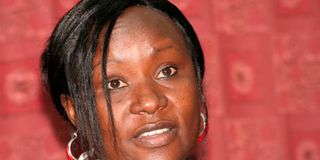Mentor younger, aspiring politicians to build formidable female leaders

Veteran politician Charity Ngilu mentored a young Cecily Mbarire (pictured) a former university student leader who entered politics as a nominated MP in 2003, even though they belonged to different political parties.
What you need to know:
- While women, specifically in Africa are the majority voters, they remain the minority when it comes to holding top political office - elective or appointive.
- Persuading political parties to remove obstructions that are directly or indirectly responsible for inappropriate policies to women’s participation in decision-making in the parties will ensure equality of gender in our politics.
As she led a shocked country - during a difficult period - in mourning her predecessor John Pombe Magufuli, President Samia Suluhu paused - to assure Tanzanians, and emphatically so, that she was capable and that the nation was in able hands.
Her reassurance did not come out of the blue. It was targeted at certain quarters - most likely the political leadership – those who doubted her ability to lead the East African nation’s 61 million people. It was obvious the reservations of the doubting Thomases emanated from the fact that she is a woman.
And President Suluhu, in her charismatic flair made that known as she sought to allay the hushed but audible fears. Those with misgivings had experienced her leadership since she was first elected in 2015 as a running mate, and the duo’s 2020 re-election.
The 61-year old had served as a cabinet minister in earlier regimes, including as Minister of State for Union Affairs in Jakaya Kikwete’s government. One would have expected that this, and the fact that President Magufuli chose her as running mate over other equally or better experienced politicians, was confirmation that she would comfortably take over the leadership mantle.
Political office
Now into the third month of her reign, President Suluhu, first elected into political office in the year 2000, has proven to skeptics that she is capable, proficient and in charge, and would surely steer Tanzania to greater heights, her gender notwithstanding.
While women, specifically in Africa are the majority voters, they remain the minority when it comes to holding top political office - elective or appointive. While the situation is sluggishly changing, it becomes clearer that women’s greater participation in democratic politics, brings in new sensitivities, intuitions and insights into leadership. In the case of Tanzania for instance, one can tell it is part of what the new president brings to the table.
She comes across as more thoughtful, measured and conscientious than her predecessor. These values are mutual among top female political leaders worldwide. New Zealand Prime Minister Jacinda Ardern, outgoing German Chancellor Angela Merkel - the first woman to be elected to that position and who in 2014, made history as the longest serving head of government in the European Union, and Ellen Johnson Sirleaf, former president of Liberia and Africa’s first elected head of State, are just some of the outstanding examples.
Back home, the need and urgency to remedy the gender imbalance in our politics cannot be disaffirmed as we head towards what is likely to be another divisive and heated election in 2022 - if the political situation instigated by the Building Bridges Initiative is anything to go by.
Remove obstructions
Persuading political parties to remove obstructions that are directly or indirectly responsible for inappropriate policies to women’s participation in decision-making in the parties and to analyse those issues from a gender perspective, is the way to go. This will ensure equality of gender in our politics.
Experience has, however, shown (and should teach us) that Kenya’s political field - which is male-dominated, is still averse to fair play of both gender. Political parties are the chief culprits.
Mentorship of young women by older and experienced colleagues is a worthy way of building the numbers in the political scene and retention. There are young, capable, courageous and focused young women rearing to dive into mainstream politics, but have been either unable to penetrate the thick wall of patriarchy or are simply unaware of how to go about.
While some are already working within their political parties, others are already in Parliament and at the County Assembly - mostly nominated.
This is my take: The older female politicians need to hold their hands, mentor and encourage them. It will pay and it has.
As a long serving Parliamentary reporter and editor for the Daily Nation, I watched with interest as veteran politician Charity Ngilu, current Kitui Governor, mentor young Cecily Mbarire - a former university leader who entered politics as a nominated MP in 2003. A former Kitui Central MP and cabinet minister in various portfolios, Ms Ngilu held Ms Mbarire’s hand even as they operated from different political parties.
After serving one term as a nominated legislator, Ms Mbarire went on to be elected for two straight terms, as Runyenjes MP, and appointed assistant minister in the Ministry of Transport as well as for Tourism. In the 2017 General Election, she lost in her bid for Embu governorship and was consequently nominated to the National Assembly by her Jubilee party.
The writer is a journalist, founder and executive director, The Woman’s Newsroom Foundation. [email protected]





